14 November, 2018 | Awards, Resource and waste management
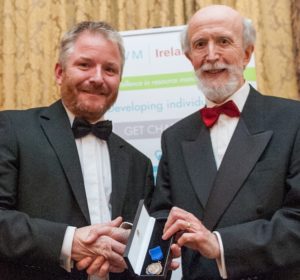
DCW hands over his CIWM Presidential Medal for 2018 to Mike Webster
https://www.babyscanclinic.com/blog/buy-cialis-tadalafil-online-20-mg/
At the CIWM Presidential Dinner at the Intercontinental Hotel in Dublin, after the inauguration of Enda Kiernan as the next President, DCW’s last act as the retiring President was to award his CIWM Presidential Medal for 2018. The recipient was Mike Webster, the founder and CEO of the new charity Wasteaid, which is working directly with local communities in some of the least developed countries to tackle the global waste crisis. The text of DCW’s speech is reproduced below.
‘Being able to award the President’s Medal is one of the perks of being President, and indeed the only thing that is expected of you after you hand over the chain…. The standard advice is to give it to someone who has particularly helped in my career or in my Presidential year.
I started out in 1974, so my early influencers are now either quite old or have already moved on to the great Circular Economy in the sky.
Looking back on my career, one of the aspects I take most pride in is the number of (then) young people whom I have either brought into the resource and waste sector, or to whose development I have made some contribution; and who I hope won’t be offended if I refer to them, tongue in cheek as, at least in part, my “protégées”.
I am also aware that, in the twilight of my own career, I am leaving behind much unfinished business. So, my thoughts here have gone to one of those protégées, whom I believe can take forward, and make a difference in, an area that is close to my heart. I devoted at least 20 years of my life to working with international organisations, national governments and large cities to develop integrated and sustainable waste management systems.
I have recently drawn attention to the global waste crisis, the more than 3 billion people worldwide who still lack access to basic solid waste management services, which reinforces the comparative failure of such top down approaches; yes, we have made some progress, but it is painfully slow, and corruption often impedes progress. So, I have come to the realisation that, in parallel, we also need to work from the bottom up.
This person is already making an impact, by opening-up opportunities for you and me, as individual resource and waste management professionals and as companies, to get involved and to make a real difference by helping local communities in some of the poorest countries to help themselves by making products to sell locally from the low value organics and plastics in the waste – thus helping to solve their local waste problems, keeping plastics out of the oceans AND giving themselves sustainable livelihoods to feed and educate their families.
This person has done this at considerable personal sacrifice, giving up a secure job to set up a new charity, initially drawing little or no salary while their children were still very young. The charity is now taking off, helped in part by the success of the CIWM-sponsored Toolkit; income has doubled this year, and looks set to triple that figure next year to more than a quarter of a million pounds.
The winner the 2018 CIWM President’s medal is Mike Webster, the Founder and CEO of our sector’s very own charity, Wasteaid.’
14 November, 2018 | Awards, Resource and waste management
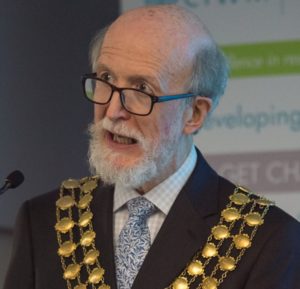
DCW gives his final speech as CIWM President
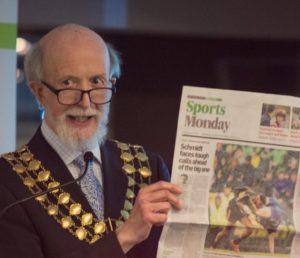
The Gaelic Football team which Enda Kiernan manages appeared in the lead photo story of the previous day’s Irish Times
Professor David C Wilson handed over the Presidency of CIWM, the UK and Irish professional body for resources and waste, to Enda Kiernan at the Aviva Stadium in Dublin on 13 November 2018. He highlighted plastics – both plastics entering the oceans and China’s ban on imports for recycling – as the dominant topic in his Presidential year. The public focus on marine plastics also helped dissemination of his Presidential report, the CIWM-Wasteaid Toolkit Making Waste Work; the website clocked 56,000 visits in its first year, with 7,000 downloads. DCW introduced his fellow Irishman, Enda Kiernan of Cork County Council as the next President. CIWM waited more than a century for its first Irish President; now we have had three in five years, and two in a row, although Enda is the first from the Republic of Ireland.
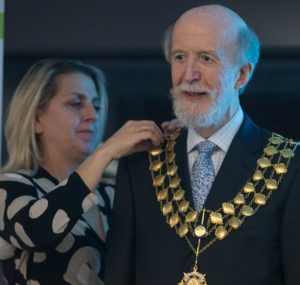
The chain of office is removed from DCW to pass over to Enda Kiernan
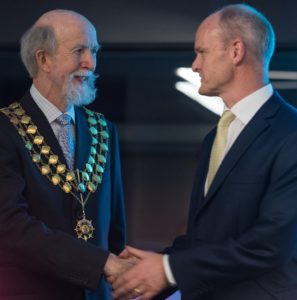
DCW congratulates Enda Kiernan on becoming the 103rd President of CIWM
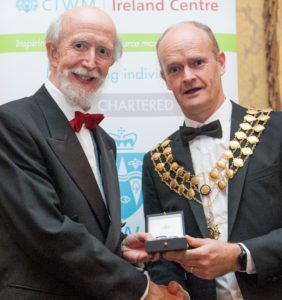
Enda Kiernan presents DCW with his Past President’s medal
30 January, 2018 | Awards, Publication, Resource and waste management
DCW’s January column for the CIWM Journal showcases the five shortlisted entries for the Best Reuse Project at the CIWM Sustainability and Resource Awards 2017. As the judge for this category, DCW was inspired by the quality and sheer variety of the five very different reuse projects. He hopes that the projects will inspire others too, as we try to ensure that reuse, sitting near the top of the waste hierarchy, receives the same priority as has been given to recycling.
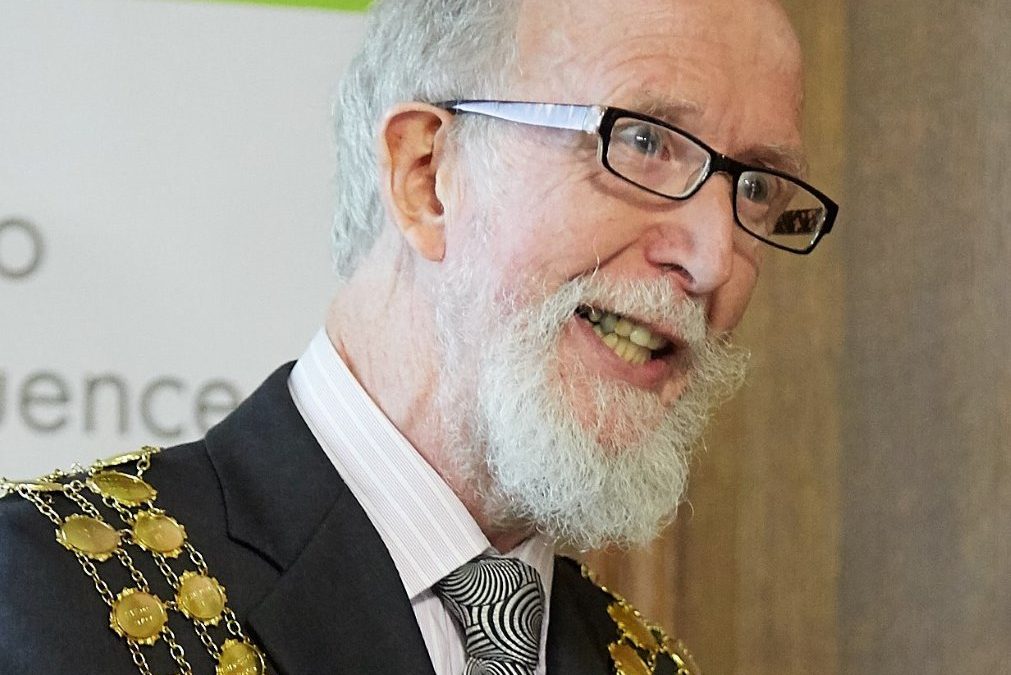
18 October, 2017 | Awards, Resource and waste management
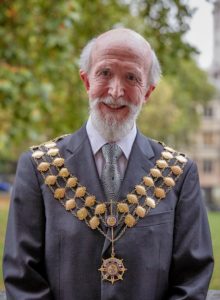
Professor David C Wilson following his inauguration in Westminster as 2017-18 CIWM President
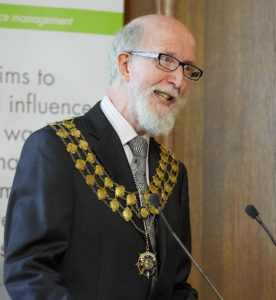
Professor David C Wilson giving his inauguration speech as CIWM President 2017-18
https://samtech.edu/accutane-treating/
Professor David C. Wilson has been inaugurated as the 102nd President of CIWM, the UK and Irish professional body for resources and waste, at a reception in London. He described solid waste management as one of the key utilities and said that as public sector budgets continue to come under pressure, “we must not lose sight of where we have come from, that the service exists first and foremost to protect public health”. He highlighted the ‘global waste management emergency’, where 40% of the World’s population lacks this basic utility service. He also launched his Presidential report, Making Waste Work: A Toolkit, prepared by WasteAid UK and aimed at helping unserved communities in the least developed countries to help themselves, by developing self-sustaining businesses making useful products for the local market from the resource value in their waste.
Outlining the importance of legislation in the substantial progress that has been made in the sustainable and safe management of waste since the early 1970s, Professor Wilson added that there can be no softening of the regulatory framework. “Two major priorities for CIWM in the UK are to ensure that following Brexit we have continuity of the strong regulations on which the very existence of the waste and resources industry depends, and the continuing fight against waste crime.”
While continuity is important on one hand, DCW went on to talk about the step change in approach to resources and waste that is happening, and he called for a “necessary parallel focus on the 3Rs – reduce, reuse, recycle – and on the shift from the linear model to a circular economy where resource efficiency and productivity is key”. An integrated and inclusive approach will be needed, he said, as well as a balanced set of policy drivers.
Professor Wilson highlighted that, despite the progress that has been made, more than 2 billion people have no waste collection at all and the waste of over 3 billion people is either dumped or subject to uncontrolled burning. This matters: for example, children growing up in households without waste collection have double the rate of diarrhoea and six times the rate of acute respiratory infection; and open burning of waste could double the current, official IPCC estimates of the contribution of methane emissions form landfill of waste to global warming. However, he also sees this ‘global waste management emergency’ as an opportunity for the international community. “If we can increase the proportion of existing international development finance being directed at SWM from the current, fairly derisory, 0.3% to just 3% up to 2030, as recommended in the GWMO, then not only can we extend waste collection to all and eliminate open dumping and burning of waste, but due to the cross-cutting nature of waste management, we can also make progress against no fewer than 12 out of the 17 UN Sustainable Development Goals agreed by world leaders to achieve a sustainable future for our planet.”
Press coverage:
Resource: Community waste schemes, the global waste crisis, domestic issues, DCW’s life in waste.
Waste Management World: Waste as a utility, domestic issues, the global waste emergency.
Letsrecycle.com: Global waste emergency, community waste toolkit
Recycling Waste World: Community waste toolkit
CIWM-journal: Waste as a utility, domestic issues, the global waste emergency, community waste toolkit
Interview with DCW in CIWM Journal:
22 November, 2016 | Awards, Publication, Waste Management
Professor David C Wilson was installed as Senior Vice President of the Chartered Institution of Wastes Management on 18 October 2016. CIWM has now commissioned WasteAid UK to undertake his Presidential project, which will prepare guidance on low-cost reuse and recycling technologies for use in low- and middle- income countries. This was one of the recommendations for follow-up work coming out of the 2015 UNEP Global Waste Management Outlook, for which DCW was the Editor-in-Chief.
Further information is available in a joint CIWM and Wasteaid UK press release issued today. Professor Wilson said: “More than two billion people worldwide do not have a waste collection service, which results in severe public health problems – through children playing amongst waste, blocked drains, infectious diseases and inhalation of smoke from open burning. Even when waste is collected, uncontrolled dumping is the norm – the waste of some 3 billion people isn’t disposed of safely.
“Many cities in Africa and Asia are growing so rapidly that in 15-20 years’ time they will be generating twice as much waste as they do today. Already struggling with the waste crisis, these cities desperately need targeted support from the international community. In the meantime, sustainable and self-financing community-led solutions can make immediate improvements, hence the focus of this research.”
WasteAid UK delivers training in community waste management in low- and middle-income countries. In its first year the charity has worked in the Gambia, Senegal, Ghana and Kenya, setting up community recycling facilities and positively impacting the lives of some 124,000 people.
Mike Webster of WasteAid UK said: “This guidance, funded by CIWM, will enable us to help thousands of communities around the world to improve the way they manage their waste. It will show people how to treat different materials to maximise their value and minimise risks to human health and the environment.” DCW is Patron of Wasteaid UK.
22 October, 2015 | Awards, Waste Management
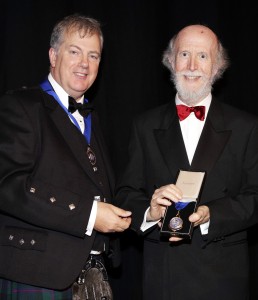
DCW receiving his medal of office as CIWM Junior Vice President from Prof Jim Baird
Professor David C Wilson has been elected as Junior Vice-President by the Trustees of his professional body, the Chartered Institution of Wastes Management (CIWM). Under the CIWM constitution, DCW is due to become CIWM President for one year from October 2017.
DCW was installed in office by the incoming President, Professor Jim Baird, at the Presidential Dinner in Kelvinsgrove Museum, Glasgow, on 21 October 2015. Jim Baird is the 100th individual to hold office as CIWM President. CIWM is the professional body for waste and resource management professionals in the UK and Ireland. It is the linear descendant of the Association of Cleansing Superintendents of Great Britain, founded in 1898.









